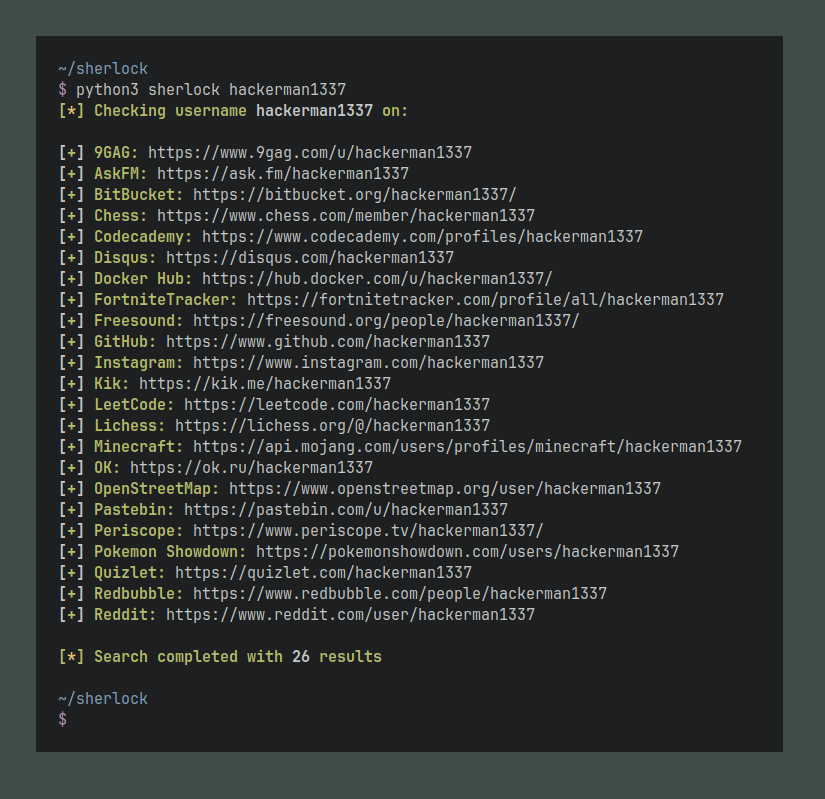Sherlock: An Interesting Open Source Intelligence Contribution
December 2, 2019
Secrets have a way of becoming non-secrets. How is often mysterious. Navigate to “Find Usernames across Social Networks.” Fire up the system and behold what for some was a function worthy of hushed tones in meetings held in drab rooms with plastic furniture.

Plug in a user name. The software chugs through publicly accessible services looking for matches.
Why is this useful? If the value of locating user names is not clear, DarkCyber is not going to flip on your light bulb.
As I write this, I can think of companies in England, Germany, Israel, and Italy which are likely to be doing a bit of critical thinking.
Sherlock could have an impact on those firms’ sales pitches and possibly their revenue. As our fictional hero allegedly said, “You know my methods, Watson.”
Stephen E Arnold, December 2, 2019
Calculus Made Almost Easy
December 2, 2019
Just a quick tip of the hat to 0a.io. You have to love that url. Navigate to “Calculus Explained with Pics and Gifs.”
The site provides an overview of calculus. Pictures and animations make it easy to determine if one was sleeping in calculus class or paying attention.
The site went live with the information five years ago. One of the DarkCyber team spotted it and sent along the link. Worth a visit.
Stephen E Arnold, December 2, 2019
Insight from a Microsoft Professional: Susan Dumais
December 1, 2019
Dr. Susan Dumais is Microsoft Technical Fellow and Deputy Lab Director of MSR AI. She knows that search has evolved from discovering information to getting tasks done. In order. To accomplish tasks, search queries are a fundamental and they are rooted in people’s information needs. The Microsoft Research Podcast interviewed Dr. Dumais in the episode, “HCI, IR, And The Search For Better Search With Dr. Susan Dumais.”
Dr. Dumais shared that most of her work centered around search stems from frustrations she encountered with her own life. These included trouble learning Unix OS and vast amounts of spam. At the beginning of the podcast, she runs down the history of search and how it has changed in the past twenty years. Search has become more intuitive, especially give the work Dr. Dumais did when providing context to search.
“Host: Context in anything makes a difference with language and this is integrally linked to the idea of personalization, which is a buzz word in almost every area of computer science research these days: how can we give people a “valet service” experience with their technical devices and systems? So, tell us about the technical approaches you’ve taken on context in search, and how they’ve enabled machines to better recognize or understand the rich contextual signals, as you call them, that can help humans improve their access to information?
Susan Dumais: If you take a step back and consider what a web search engine is, it’s incredibly difficult to understand what somebody is looking for given, typically, two to three words. These two to three words appear in a search box and what you try to do is match those words against billions of documents. That’s a really daunting challenge. That challenge becomes a little easier if you can understand things about where the query is coming from. It doesn’t fall from the sky, right? It’s issued by a real live human being. They have searched for things in the longer term, maybe more acutely in the current session. It’s situated in a particular location in time. All of those signals are what we call context that help understand why somebody might be searching and, more importantly, what you might do to help them, what they might mean by that. You know, again, it’s much easier to understand queries if you have a little bit of context about it.”
Dr. Dumais has a practical approach to making search work for the average user. It is the everyday tasks that build up that power how search is shaped and its functionality. She represents an enlightened technical expert that understands the perspective of the end user.
Whitney Grace, November 30, 2019


